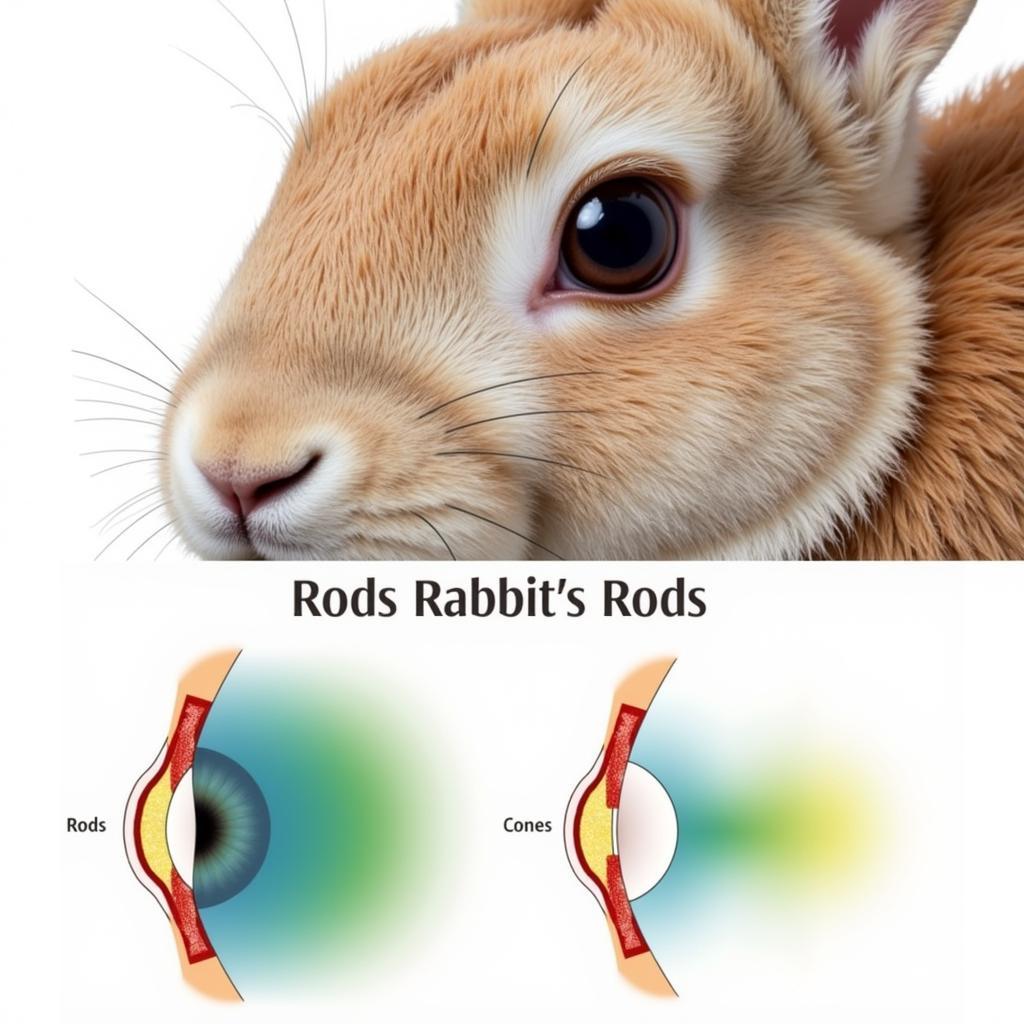Rabbits, those adorable, fluffy creatures, have captivated us for centuries. But have you ever wondered how they see the world? A common question that arises is, are rabbits color blind? The answer, as with many things in nature, is a little more complex than a simple yes or no.
Decoding Rabbit Vision
While rabbits aren’t completely color blind, their color perception is significantly different from ours. They possess two types of cone cells, the photoreceptors responsible for color vision. Humans, by comparison, have three. This means rabbits can see some colors, but not the full spectrum that humans perceive. Their vision is dominated by greens and blues, with some sensitivity to yellow. They likely cannot see the rich reds and oranges that we can. So, while they don’t live in a monochrome world, their colorful experience is limited.
 Rabbit Eye Structure and Color Perception
Rabbit Eye Structure and Color Perception
How Does This Affect Their Lives?
This limited color vision plays a vital role in a rabbit’s survival. Being prey animals, rabbits rely heavily on their ability to detect movement and changes in their environment. Their dichromatic vision, focusing on greens and blues, helps them distinguish subtle variations in their surroundings, allowing them to spot predators more easily in the grassy, leafy habitats they often inhabit.
What Colors Do Rabbits See Best?
As mentioned, rabbits see greens and blues most clearly. They can also distinguish some shades of yellow. This helps them identify nutritious plants and navigate their surroundings. Imagine a rabbit foraging for food – its ability to differentiate between various shades of green allows it to select the most succulent and nutritious plants.
Comparing Rabbit Vision to Human Vision
The difference between rabbit and human vision is substantial. Our trichromatic vision allows us to perceive a much wider range of colors. Imagine looking at a vibrant rainbow – a rabbit would see a muted version, missing the vibrant reds, oranges, and purples. This doesn’t mean their vision is inferior, simply adapted to their specific needs.
Can Rabbits See in the Dark?
Another common question related to rabbit vision is their ability to see in the dark. While they don’t have true night vision like some nocturnal animals, rabbits can see relatively well in low light conditions. This is due to the high number of rod cells in their eyes, which are specialized for detecting light and movement in dim environments. This adaptation is crucial for their survival, allowing them to navigate and forage during dawn and dusk, avoiding predators under the cover of limited light.
Understanding Rabbit Behavior Through Their Vision
Understanding a rabbit’s visual capabilities can help us better interpret their behavior. For instance, if you’ve ever noticed a rabbit suddenly freeze still, this is likely a response to detecting movement or a change in their environment that they perceive as a potential threat. Their limited color vision, combined with their heightened sensitivity to movement, dictates many of their reactions.
Conclusion: A Different Perspective
So, are rabbits color blind? Not entirely. While their color perception differs significantly from ours, their dichromatic vision is perfectly adapted to their needs as prey animals. Their ability to see blues and greens, along with their enhanced sensitivity to movement and low light, plays a critical role in their survival. Understanding how rabbits see the world allows us to appreciate the unique adaptations of these fascinating creatures and better care for them as pets or admire them in their natural environment.
FAQ
- Are rabbits totally color blind? No, rabbits can see some colors, primarily blues and greens.
- Why do rabbits have limited color vision? This adaptation is thought to aid in detecting predators and foraging for food.
- What colors do rabbits see best? Blues and greens are the colors rabbits see most clearly.
- Can rabbits see in the dark? While not truly nocturnal, rabbits can see relatively well in low light conditions.
- How does rabbit vision affect their behavior? Their sensitivity to movement and limited color vision influences their responses to potential threats and their foraging habits.
- What is the difference between rabbit vision and human vision? Humans have trichromatic vision, allowing us to see a much broader spectrum of colors than rabbits.
- How can I use this knowledge to better care for my rabbit? Understanding their visual limitations can help you create a more enriching and safe environment for your pet rabbit.
when does hunting season start in colorado
Need further assistance? Contact us at Phone: 0373298888, Email: [email protected], or visit our address at 86 Cau Giay, Hanoi. Our customer service team is available 24/7.

